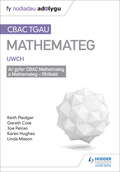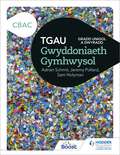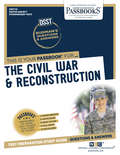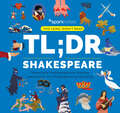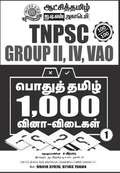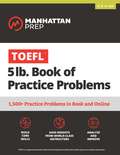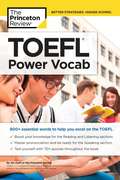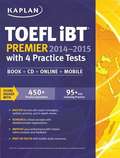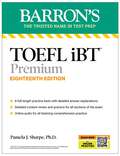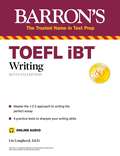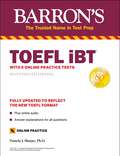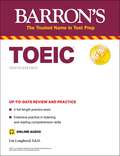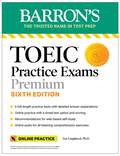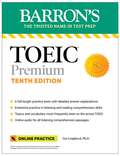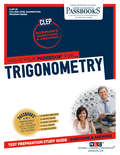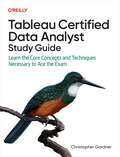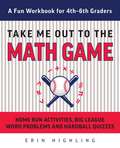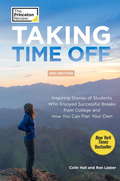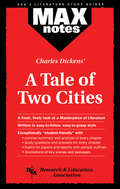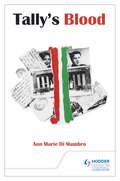- Table View
- List View
TGAU CBAC Canllaw Adolygu Mathemateg Uwch (WJEC GCSE Maths Higher: Mastering Mathematics Revision Guide Welsh-language edition)
by Gareth Cole Keith Pledger Joe PetranExam Board: WJECLevel: GCSESubject: MathematicsFirst Teaching: September 2015First Exam: June 2017Welsh language edition. Maximise your students' grade potential with a step-by-step approach that builds confidence through topic summaries, worked examples and exam style questions.- Identify areas of improvement to focus on through diagnostic tests for each topic.- Develop exam skills and techniques with skills-focused exam-style questions and exam advice on common pitfalls.- Build understanding and confidence with clear explanations of each topic covering all the key information needed to succeed.- Consolidate revision with 'two weeks to go' summaries for each topic.
TGAU CBAC Canllaw Adolygu Mathemateg Uwch (WJEC GCSE Maths Higher: Mastering Mathematics Revision Guide Welsh-language edition)
by Gareth Cole Keith Pledger Joe PetranExam Board: WJECLevel: GCSESubject: MathematicsFirst Teaching: September 2015First Exam: June 2017Welsh language edition. Maximise your students' grade potential with a step-by-step approach that builds confidence through topic summaries, worked examples and exam style questions.- Identify areas of improvement to focus on through diagnostic tests for each topic.- Develop exam skills and techniques with skills-focused exam-style questions and exam advice on common pitfalls.- Build understanding and confidence with clear explanations of each topic covering all the key information needed to succeed.- Consolidate revision with 'two weeks to go' summaries for each topic.
TGAU Gwyddoniaeth Gymhwysol CBAC: Single and Double Award
by Jeremy Pollard Adrian Schmit Sam HolymanDevelop students' understanding of Applied Science with engaging content and support throughout the course, produced by a trusted author team and an established WJEC GCSE Science publisher.Students will be able to:- learn what they need to know, with content clearly signposted to support the WJEC GCSE Applied Science Single Award and Double Award qualifications, at both lower and higher tier - approach exams with confidence, by checking their understanding with Test yourself questions, Discussion points, exam-style questions and useful Chapter summaries- build their practical skills with support for all specified practicals along with extra tasks for broader learning- develop the core mathematical skills required by the course with worked examples throughout the book.
TGAU Gwyddoniaeth Gymhwysol CBAC: Single and Double Award
by Jeremy Pollard Adrian Schmit Sam HolymanDevelop students' understanding of Applied Science with engaging content and support throughout the course, produced by a trusted author team and an established WJEC GCSE Science publisher.Students will be able to:- learn what they need to know, with content clearly signposted to support the WJEC GCSE Applied Science Single Award and Double Award qualifications, at both lower and higher tier - approach exams with confidence, by checking their understanding with Test yourself questions, Discussion points, exam-style questions and useful Chapter summaries- build their practical skills with support for all specified practicals along with extra tasks for broader learning- develop the core mathematical skills required by the course with worked examples throughout the book.
THE CIVIL WAR & RECONSTRUCTION: Passbooks Study Guide (DANTES Subject Standardized Tests (DSST))
by National Learning CorporationThe DSST Subject Standardized Tests are comprehensive college and graduate level examinations given by the Armed Forces, colleges and graduate schools. These exams enable students to earn college credit for what they have learned through self-study, on the job, or by other non-traditional means. The DSST The Civil War & Reconstruction Passbook® prepares candidates for the DSST exam, which enables schools to award credit for knowledge acquired outside the normal classroom environment. It provides hundreds of questions and answers in the areas that will likely be covered on your upcoming exam, including but not limited to: causes of the war; slavery and abolition; westward expansion; military battles; the Reconstruction Era; and more.
TL;DR Shakespeare: Dynamically illustrated plot and character summaries for 12 of Shakespeare's greatest plays (Too Long; Didn't Read)
by SparkNotesThis refresher reference volume features concise character and plot summaries for 12 of Shakespeare&’s best-known plays, drawn from the SparkNotes website and illustrated with colorful infographics. Each of the 12 chapters in this volume runs 6 to 8 pages of text taken from the SparkNotes website, and is illustrated with colorful infographics for easy consumption. The 12 plays featured—six comedies and six tragedies—are among the most famous and most taught of Shakespeare&’s dramas, including Hamlet, King Lear, Macbeth, Romeo and Juliet, The Taming of the Shrew, The Merchant of Venice, Othello, and Julius Caesar.
TNPSC Combined Group IV and VAO Competitive Exam Part 4 Tamil Nadu History, Tradition, Culture and Thirukkural: TNPSC ஒருங்கிணைக்கப்பட்ட GROUP - IV தேர்வு பகுதி – IV தமிழ்நாட்டின் வரலாறு, மரபு, பண்பாடு மற்றும் திருக்குறள், தமிழகத்தில் வளர்ச்சி நிர்வாகம், மற்றும் சமீபத்திய செய்திகள்
by V V K Subburasuஇந்த புத்தகம் வீ.வீ.கே. சுப்புராசு அவர்களால் எழுதப்பட்டு சுரா பதிப்பகத்தால் வெளியிடப்பட்டுள்ளது. இப்புத்தகத்தில் ஒருங்கிணைந்த குடிமைப் பணிகள் தேர்வு 4 மற்றும் கிராம நிர்வாக அலுவலர் பணிகளுக்கான தமிழ்நாட்டின் வரலாறு, மரபு, பண்பாடு, திருக்குறள், தமிழகத்தில் வளர்ச்சி நிர்வாகம், மற்றும் சமீபத்திய செய்திகள் பாடங்களை நன்கு படித்து அறிந்து கொள்ளலாம் மேலும் முந்தைய டிஎன்பிஎஸ்சி தேர்வில் கேட்கப்பட்ட வினாக்களுக்கான விடைகள் கொடுக்கப்பட்டுள்ளது
TNPSC Group 4 and VAO Exam Science, History, Tamil, Indian Polity and Economics Part 2 - Competitive Exam: TNPSC குரூப் 4 மற்றும் VAO தேர்வு அறிவியல், வரலாறு, தமிழ், இந்திய அரசியல் மற்றும் பொருளாதாரம் பகுதி 2
by Department of Employment and Training - Government of Tamil Naduஇந்தப் புத்தகம் DNBSC குரூப் 4 மற்றும் VOA தேர்வுக்கான அறிவியல், வரலாறு, தமிழ், இந்திய அரசியல் மற்றும் பொருளாதாரப் படிப்புகள் பற்றிய தகவல்களை வழங்குகிறது.
TNPSC Group 4 and VAO exam study material Indian History and Indian Economics Part 1 - Competitive Exam: ஒருங்கிணைந்த குடிமைப்பணிகள் தேர்வு - 4 (தொகுதி 4 & வி ஏ ஓ) இந்திய வரலாறு மற்றும் இந்திய பொருளாதாரம் பகுதி 1
by Department of Employment and Training - Government of Tamil Naduஇந்தப் புத்தகத்தில் டிஎன்பிஎஸ்சி குரூப் 4 மற்றும் விஏஓ தேர்விற்கான இந்திய வரலாறு மற்றும் இந்திய பொருளாதாரம் பாடப்பகுதிகள் குறித்த தகவல்கள் கொடுக்கப்பட்டுள்ளது
TNPSC Group II, IV, VAO exam General Tamil 1000 Question and Answers: TNPSC Group II, IV, VAO பொதுத்தமிழ் ஆயிரம் வினா மற்றும் விடைகள் ஆட்சித்தமிழ் ஐ.ஏ.எஸ் அகாடெமி
by Mr S Veerababuஇந்த தொகுப்பானது ஆட்சித் தமிழ் ஐ.ஏ.எஸ். அகடமி நிறுவனத்தால் தமிழ்நாடு அரசு பணியாளர் தேர்விற்காக தயார் செய்யும் பொருட்டு 10 பொதுத் தமிழ் மாதிரி வினாத்தாள் விடைகளுடன் தொகுக்கப்பட்டு வழங்கப்பட்டுள்ளது..
TOEFL 5lb Book of Practice Problems: Online + Book
by Manhattan PrepManhattan Prep’s TOEFL 5 lb. Book of Practice Problems is an essential resource for students of any level who are preparing for the TOEFL. With more than 1,500 questions across 46 chapters in the book and in online resources, TOEFL 5 lb. provides students with comprehensive practice. Developed by our expert instructors, the problems in this book are sensibly grouped into practice sets and mirror those found on the TOEFL in content, form, and style. Students can build fundamental skills in Reading, Listening, Speaking and Writing through targeted practice, while easy-to-follow explanations and step-by-step processes help cement their understanding of the concepts tested on the TOEFL. In addition, students can take their practice to the next level with online question banks that provide realistic, computer-based practice to better simulate the TOEFL test-taking experience. Purchase of this book includes access to additional online resources and practice.
TOEFL Power Vocab: 800+ Essential Words to Help You Excel on the TOEFL
by Princeton Review800+ WORDS TO HELP YOU EXCEL ON THE TEST OF ENGLISH AS A FOREIGN LANGUAGE!• Boost your knowledge for the Reading and Listening sections• Master pronunciation and be ready for the Speaking section• Test yourself with 70+ quizzes throughout the bookImproving your vocabulary is one of the most important steps you can take to feel more confident about the Test of English as a Foreign Language. The Princeton Review's TOEFL Power Vocabulary has the words, tools, and strategies you need to help boost your comprehension levels and improve your score, including:• 800+ frequently-appearing TOEFL exam words • In-context examples and secondary definitions that help focus your study sessions• Mnemonic devices and root guidelines that expand your vocabulary• Brief vocab sections that break down content and let you work at your own pace• Quick quizzes with varied drills (definitions, word pairs, synonyms, antonyms, and more) to help cement your knowledge• Final drill section at the end of the book so you can assess your progress
TOEFL iBT Premier (Fifth Edition)
by The Editors at the Kaplan PublishingThis book is a comprehensive TOEFL program with full-length practice tests.
TOEFL iBT Premium with 8 Online Practice Tests + Online Audio, Eighteenth Edition (Barron's Test Prep)
by Pamela J. Sharpe Ph.D.Barron&’s newest edition of TOEFL iBT has been fully updated to reflect the new TOEFL format and provides flexible study options and key skills review to help you study what you need to know for the test. This edition includes: 8 full-length TOEFL iBT practice tests that reflect the most recent test format with answer explanations Comprehensive review of required academic and language skills Four video lessons on the key skills needed to succeed on the TOEFL: Note Taking, Paraphrasing, Summarizing, and Synthesis Grammar review that supports the Speaking and Writing Sections Online audio for all listening prompts
TOEFL iBT Writing (Barron's Test Prep)
by Lin Lougheed Ph.D.TOEFL iBT Writing prepares students to succeed on the TOEFL's Independent Task, the all-important essay question, and on the Integrated Task, which combines reading, listening, and writing skills.The author presents a three-step program designed to help students write like native speakers of English. His coaching entails gathering ideas, organizing details, and developing the chosen topic into clear, grammatical written English. He also provides exercises in proofreading and editing. Model essays and model integrated tasks are included for students to read and analyze. Audio lectures typical of those presented on actual tests are included online.Lin Lougheed presents a three-step program designed to help students write like native speakers of English. The three steps include:Gathering ideasOrganizing detailsDeveloping the chosen topic into clear, grammatical written EnglishThe book also provides:Exercises in proofreading and editingModel essays and integrated tasks to read and analyzeOnline audio lectures similar to those presented on actual testsPublisher's Note: Products purchased from Third Party sellers are not guaranteed by the publisher for quality, authenticity, or access to any online entitlements included with the product.
TOEFL iBT: with 8 Online Practice Tests (Barron's Test Prep)
by Pamela J. Sharpe Ph.D.Barron&’s newest edition of TOEFL iBT has been fully updated to reflect the new TOEFL format and provides flexible study options and key skills review to help you study what you need to know for the test. You&’ll also get 8 full-length practice tests, 8 one-hour practice tests, four video lessons, online PowerPoint presentations, and online audio files for all the practice to help you feel prepared on test day.This edition includes:Eight full-length TOEFL iBT practice tests with answer explanations in both the book and online8 one-hour practice testsA review of required academic and language skills with four video lessons and a grammar review that supports the Speaking and Writing SectionsAn online pronunciation guide that features over 200 campus flashcards with vocabulary terms and example sentencesMP3 audio files online for all promptsA general overview of the TOEFL iBTPowerPoint review presentations with handouts and resources for tutors and teachers
TOEIC (Barron's Test Prep)
by Lin Lougheed Ph.D.Barron&’s TOEIC is updated to include online audio files for all audio prompts presented in the book.Test-takers will find:Six full-length practice tests identical in format and question types to the current TOEIC with answer explanations for all questionsTopics and vocabulary most frequently seen on the actual TOEICExtensive practice in listening and reading comprehension skillsA high score on the TOEIC is required by many businesses and institutions when considering job applicants whose first language is not English. Publisher's Note: Products purchased from Third Party sellers are not guaranteed by the publisher for quality, authenticity, or access to any online entitlements included with the product.
TOEIC Practice Exams: 6 Practice Tests + Online Audio, Sixth Edition (Barron's Test Prep)
by Lin Lougheed Ph.D.Barron&’s TOEIC Practice Exams is designed for ESL students preparing to take the Test of English for International Communication.This manual provides students with extensive practice in the actual test-taking experience as an efficient way of improving their score when they take the actual TOEIC.Inside students will findSix full-length practice exams that reflect the actual TOEIC in length, subject matter, question types, and degree of difficulty.Answer explanations for all questionsOnline audio for all six TOEIC listening comprehension sectionsRecommendations for web-based self-study activities
TOEIC Premium: 6 Practice Tests + Online Audio, Tenth Edition (Barron's Test Prep)
by Lin Lougheed Ph.D.Barron&’s TOEIC Premium is designed for ESL students preparing to take the Test of English for International Communication.Test-takers will find:Extensive practice in listening and reading comprehension skillsSix full-length practice tests identical in format and question types to the current TOEIC with answer explanations for all questionsTopics and vocabulary most frequently seen on the actual TOEICOnline audio for all six TOEIC listening comprehension sectionsRecommendations for web-based self-study activities
TRIGONOMETRY: Passbooks Study Guide (College Level Examination Program Series (CLEP) #No. Q-29)
by National Learning CorporationThe College Level Examination Program (CLEP) enables students to demonstrate college-level achievement and earn college credit in various subject areas based on knowledge acquired through self-study, high school and adult courses, or through professional means. The CLEP Trigonometry Passbook® prepares you by sharpening knowledge of the skills and concepts necessary to succeed on the upcoming exam and the college courses that follow. It provides a series of informational texts as well as hundreds of questions and answers in the areas that will likely be covered on your upcoming exam.
Tableau Certified Data Analyst Study Guide
by Christopher GardnerIn today's data-driven world, earning the Tableau Certified Data Analyst credential signals your ability to connect, analyze, and communicate insights using one of the industry's leading visualization platforms. This study guide offers practical and comprehensive preparation for the certification exam, with walk-throughs, best practices, vocabulary, and example questions to help you build both confidence and competence in Tableau.Written by Christopher Gardner, business intelligence analyst and lead Tableau developer at the University of Michigan, this guide supports first-time test-takers and seasoned users alike. You'll begin with foundational skills in Tableau Prep Builder and Tableau Desktop—connecting, combining, and preparing data—before progressing to building effective visualizations, performing calculations, and applying advanced tools like level-of-detail expressions, parameters, forecasts, and predictive analytics.Read, manipulate, and prepare data for analysisNavigate Tableau's tools to build impactful visualizationsWrite calculations and functions to enhance your dashboardsShare your work responsibly with secure publishing options
Take Me Out to the Math Game: Home Run Activities, Big League Word Problems and Hard Ball Quizzes--A Fun Workbook for 4-6th Graders
by Erin HighlingBring Math to Life with Balls, Strikes & HitsMath is everywhere, but nowhere is it more interesting than when it&’s part of the great American pastime. This workbook is a fun and engaging way to practice your math skills by relating every problem to baseball. Each activity in the book is based on real baseball situations, like batting averages, pitching speed and even stadium size. Use these scenarios to improve your math skills while also learning more about the game of baseball, on and off the field.You can go straight through the book, practicing each skill, or you can go to a specific chapter you need more practice with. Each chapter focuses on a different math skill: • Numbers in Base Ten • Operations and Algebraic Thinking • Number and Operations in Fractions • Measurement and Data • Geometry
Taking Time Off, 2nd Edition
by Ron Lieber Colin HallHave you ever thought about taking time off to * ride your bike across the United States?* conduct research in the Amazonian rain forest?* work on a presidential campaign?* build houses for the poor?Tens of thousands of students each year take a break before, or even during college to work, travel, volunteer, or do something just plain different. No matter what you may plan to do with your time away, Taking Time Off shows you how to make the most of it. Included are the inspiring stories of 26 students whose pursuits in their time away from school were fulfilling and enjoyable. You'll find practical advice on every aspect of planning a break, from researching your options and financing your leave to convincing your parents it's a worthy idea. This book's resources section also lists programs, jobs, and American and international organizations that can help you to plan your own time off.
Tale of Two Cities, A (MAXnotes Literature Guides)
by Jeffrey KarnickyREA's MAXnotes for Charles Dickens' A Tale of Two Cities MAXnotes offer a fresh look at masterpieces of literature, presented in a lively and interesting fashion. Written by literary experts who currently teach the subject, MAXnotes will enhance your understanding and enjoyment of the work. MAXnotes are designed to stimulate independent thought about the literary work by raising various issues and thought-provoking ideas and questions. MAXnotes cover the essentials of what one should know about each work, including an overall summary, character lists, an explanation and discussion of the plot, the work's historical context, illustrations to convey the mood of the work, and a biography of the author. Each section of the work is individually summarized and analyzed, and has study questions and answers.
Tally's Blood
by Ann MambroAs well as being a highly popular play for National 5 English study, Tally's Blood paints a wonderful picture of life in wartime Scotland, as experienced by the Italian immigrant community. Exploring the themes of racism, love and family loyalties, it does so with humour and warmth through the eyes of an Italian family with close blood ties. When World War Two breaks out, friendships outwith the family are sorely tested by the difficulties of wartime prejudice. - One of the set drama texts for National 5 English - Written by a very successful playwright and television screenplay writer
